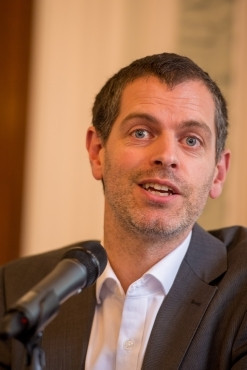
Today's the kick-off for our new weekly editorial in english simply called Ideas on Europe. Every Friday, a member of the International Academic Association - UACES - will address a current topic, and we'll respect the hierarchy, beginning with the newly elected chair, our President of the Association, Simon Usherwood, Professor at the Open University.
To start with, can you say a few words about this organisation?
Of course. Especially as ‘UACES’ doesn’t trip off the tongue.
Indeed, unlike the names of our sister organisations around Europe and the world, it doesn’t even immediately make you think of this continent or of the European Union. But it is how we are known and its full version – the ‘University Association for Contemporary European Studies’ – gives a good idea of what we are interested in.
With over a thousand members – most outside the UK – we bring together political scientists, legal experts, economists, historians, sociologists and more to research and understand the Europe we live in today. You can find out more about our work on our website www.uaces.org – I’ll make sure to put the link on your web page!
Part of what we try to do is to bring our academic work to a wider audience and this opportunity to share on Euradio our interests and reflections is one that we have seized with enthusiasm.
Each of our editorials (in English, we’d rather say ‘columns’) will come to you from one of our members, talking about their insights on a question of current interest. And no, that doesn’t mean a stream of Brits telling you about why Brexit is your fault.
Certainly not! We were sorry to see you leave! But our audience is still interested in what you have to say.
And we’re pleased to be listened to. For us, as academics, this is a chance to share some of the findings of the different research projects that we work on, presenting in accessible ways how Europe shapes our lives.
For listeners, it is a chance to see another side of our European community, from individuals who are not just students of such questions but also very nice people: I think you’ll like them a lot. Each of us has an interesting story to tell about their work; why it matters and how they got there.
My own academic journey started one morning, in the middle 1990s, in a library in Bruges. I was trying to track down a volume on something or other for my studies, when a little paper pamphlet caught my eye.
It turned out to be a rather bizarre piece of work, that claimed to have uncovered secret symbols in EU documents that linked it to the rise of the anti-Christ and the end of the world.
Impressive stuff for an organisation that I had hitherto thought was more focused on setting the wholesale price of milk and pressing for more recycling of plastics.
‘How could someone end up with views like this?’, was my rather obvious question. Well, a mere quarter of a century later, I’m still exploring that one, which sadly seems rather more consequential than it did back then.
How do you as European researcher, personally feel in this post-Brexit period?
As someone with a French mother, and working a profession that necessarily jumps across borders, I am – and always will be – a European. No matter what treaties there are – or aren’t – between the UK and the EU, that will not change.
If anything, the past few years have just underlined the weight and the importance of our shared history and our shared future. Challenges such as combatting climate change or those who try to weaken our liberal democratic values are not ones that we can fight alone.
Hopefully, this column – and my colleagues – will help to remind us all of that. And offer us all some new ‘Ideas on Europe’.
I am sure it will. Many thanks, Simon!
Next week, we will welcome your colleague Helen Drake.
More information on UACES - The academic association for contemporary European Studies -.





